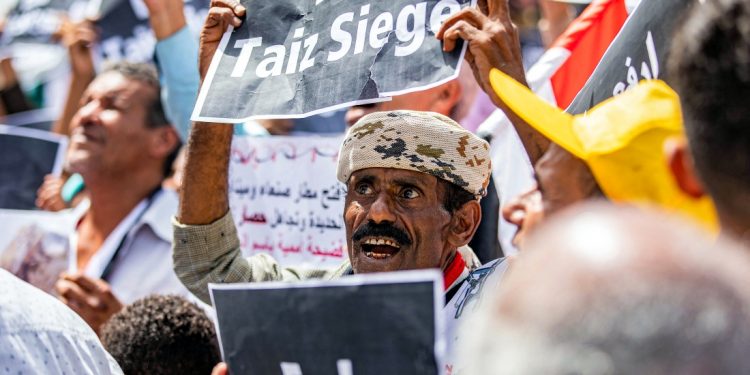Agencies-Gaza post
Yemen, Houthis start talks in Amman to end Taiz siege
Talks between the Yemeni government and the Iranian-backed Houthis about the opening of roads in Taiz city and other regions started on Wednesday when thousands assembled in the streets of Taiz to demand an immediate end to the Houthis siege.
Hans Grundberg, the UN envoy to Yemen, stated his office will sponsor the meeting between the two sides in the Jordanian capital to discuss the opening of roads in Taiz and the provinces as part of the two-month truce.
“The meeting between the government of Yemen and representatives of Ansar Allah on opening roads to #Taiz and other governorates under the truce agreement begins today in Amman under the auspices of the UN envoy for #Yemen”, tweeted Grundberg, using Houthis’ official name.
The Yemeni government representatives said it held a meeting with Grundberg shortly after landing in Amman, adding that they could confront in direct talks with the Houthis in the coming days.
“We would press to pave the way for the pre-war period and restore the flow of water and electricity to the city,” Ali Al-Ajar, a member of the government delegation, told Arab News on the phone from Amman.
The truce, which entered into force on April 2 and is the longest since the war, provided for a pause in fighting on all fronts, restarting flights from Sanaa airport, allowing supply ships to enter the port of Hodeidah, and forming a joint committee to discuss the opening of roads in Taiz, Abyan, Al-Bayda, Marib and the other provinces.
The meeting was delayed many terms as the Houthis refused to appoint their representatives, despite constant requests from international mediators.
Meanwhile, hundreds of citizens gathered in the streets of Taiz on Wednesday to demand international action to force the Houthis to end their siege of the city.
Demonstrators carried posters and slogans calling for action by Yemeni negotiators in Amman, the United Nations envoy for Yemen and the international community to end the siege that cut off the city from the rest of the country.
“The complete lifting of the siege is an inalienable human right”, reads one of the posters.
This week, the people in Taiz defied the siege of the Houthis by organizing rallies near heavily mined checkpoints on the edge of the city, drawing attention to their suffering under the siege. These gatherings are rare and reflect the despair felt by people living under siege.
For the last seven years, the Houthis have blocked the city’s main entrances and roads connecting it to Sanaa, Hodeidah and Aden. Iranian-backed terrorists planted mines and deployed snipers in surrounding areas after failing to take control of the city center due to resistance from government troops.
The blocking has driven thousands of people to famine as the Houthis prevent aid and vital goods from reaching the city, forcing people to use dangerous mountain roads.
Mohammed Al-Mekhlafi, a Yemeni political analyst, condemned the international community for not exerting enough pressure on the Houthis to lift the siege of Taiz as they did with the Yemeni government and the Coalition to revive legality in Yemen at the airport. Sanaa and the port of Hodeidah.
“The UN and the international community have not exerted serious and active pressure on the Houthis to open humanitarian corridors in Taiz. The Houthis have obtained many concessions regarding the Sanaa airport and the port of Hodeidah without offering anything in return, “Al-Mekhlafi said.
The Houthis, who usually reject they want to besiege Taiz, said on Tuesday they closed some roads in Taiz to protect people from fighting.
“Procedures in Taiz were imposed on the basis of military necessity to preserve the lives of citizens,” said Abdul Malik Al-Ajri, a Houthi negotiator, according to Houthi media. He stated the movement has not discussed extending the truce with the United Nations.

















